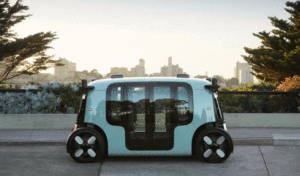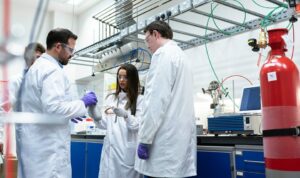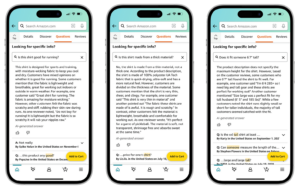The sudden success of OpenAI ChatGPT has propelled artificial intelligence (A) into the mainstream. Ever since its launch on November 30, 2022, ChatGPT has dominated the headlines and impressed millions of people around the world with its ability to write computer code, poems, songs, and even entire movie plots, pass a law, Wharton MBA, and medical exams.
Not to be outdone by ChatGPT, Google also announced the highly-anticipated Google AI chatbot, Bard early this month. While debate still rages on which AI is better, the American public isn’t convinced yet on whether AI is even good for society overall.
According to a new poll conducted by Monmouth University, or about 1 in 10, believe that AI’s impact on society will do more good than harm to society. Another 41% of people polled believe that AI technology will ultimately do harm to society overall. But, 46% of the people polled think that AI development will do about the same amount of good and harm.
Overall, the poll also found that more than half of Americans — 55% are very or somewhat worried that AI could one day pose a risk to the human race. In addition, 72% of the respondents also believe that AI will one day write entire news articles, but 78% of the people surveyed think that’s a bad thing.
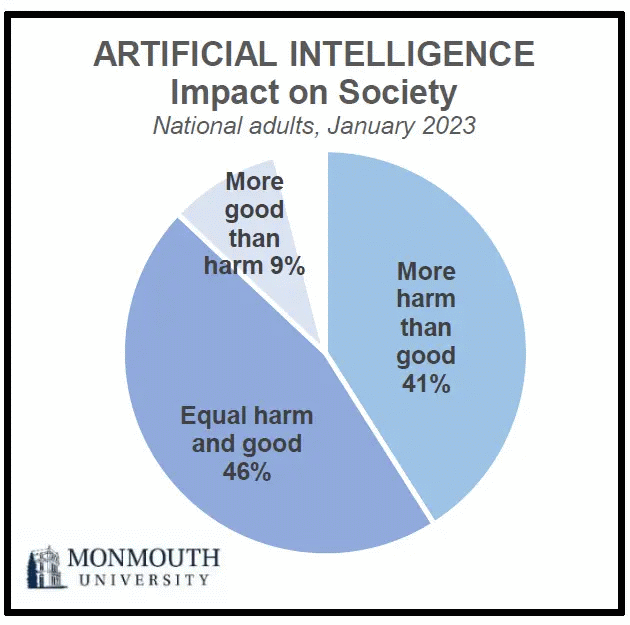 “Overall, only 1 in 10 (9%) Americans believe computer scientists’ ability to develop AI would do more good than harm to society. The remainder are divided between saying AI would do equal amounts of harm and good (46%) or that it would actually do more harm to society overall (41%). These results are largely unchanged from Monmouth’s poll in 2015, but public opinion continues to be more pessimistic about AI’s impact than it was a generation ago. When this same question was asked in 1987 by Cambridge Reports/Research International, 20% of Americans said AI would do more good than harm, 29% expected equal amounts of harm and good, and 39% said it would do more harm overall,” Monmouth University wrote.
“Overall, only 1 in 10 (9%) Americans believe computer scientists’ ability to develop AI would do more good than harm to society. The remainder are divided between saying AI would do equal amounts of harm and good (46%) or that it would actually do more harm to society overall (41%). These results are largely unchanged from Monmouth’s poll in 2015, but public opinion continues to be more pessimistic about AI’s impact than it was a generation ago. When this same question was asked in 1987 by Cambridge Reports/Research International, 20% of Americans said AI would do more good than harm, 29% expected equal amounts of harm and good, and 39% said it would do more harm overall,” Monmouth University wrote.
The poll also found that about 3 in 4 (73%) Americans feel that machines with the ability to think for themselves would hurt jobs and the economy.
Also, a majority of those polled (56%) say that artificially intelligent machines would hurt humans’ overall quality of life. These results on AI’s daily impact are basically the same as eight years ago. However, existential fears about humanity’s relationship with artificial intelligence have increased.
However, a majority (55%) of Americans are now worried at least somewhat that artificially intelligent machines could one day pose a risk to the human race’s existence. “This marks a reversal from Monmouth’s 2015 poll, when a smaller number (44%) was worried and a majority (55%) was not. Concern about the possible AI threat to human existence decreases with age – from 61% of those age 55 and older, to 55% of those ages 35 to 54, and 46% of those ages 18 to 34. However, the level of concern is similar for people who have been paying a lot of attention to AI news and those who have heard only a little or nothing about recent developments,” Monmouth University said.
Worries About AI.
Monmouth pollsters also asked the respondents to get their reactions about six practical applications involving artificial intelligence, five of which were also asked about in 2015.
For the new item in the recent poll – the pollsters asked about the use of facial recognition technology that can identify and monitor people who try to enter public places such as stadiums. Surprisingly, a majority (54%) see it as a good idea while 41% say it is a bad idea. However, those who have heard a lot of recent developments in the field (45%) are less likely to endorse this use of AI than those who have heard only a little (56%) or nothing (71%) about these developments.
“Facial recognition has been in the news recently, such as theaters using it to bar entry to lawyers who are suing them and unreliability of the technology depending on the person’s race. My guess is that people who have been following the news closely are more likely to be aware of these incidents and are concerned about their misuse, whereas those not paying as much attention are thinking primarily of immediate safety threats when asked about the use of facial recognition technology,” said Murray.
The only other application tested in the poll that is seen as a good idea by most Americans is using AI machines to perform risky jobs such as coal mining (75%).
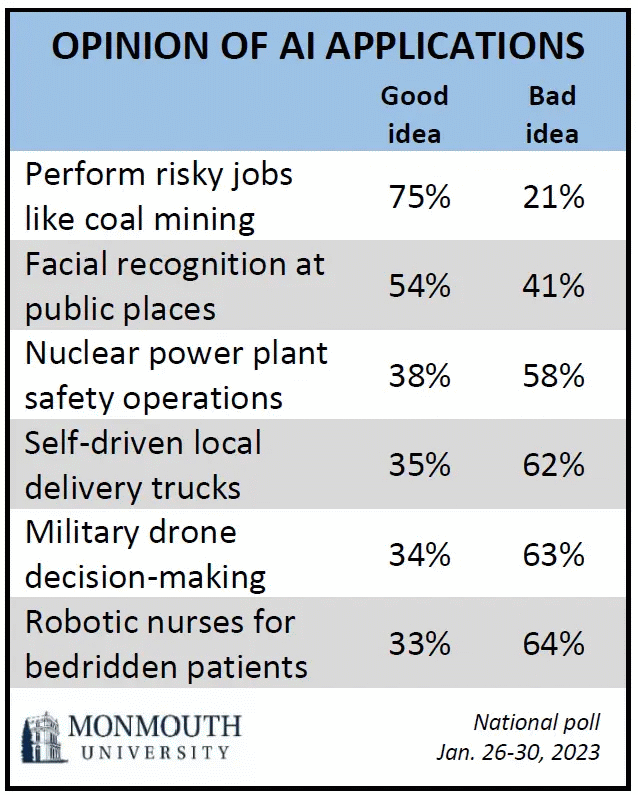
“AI has started to permeate every facet of life. Most Americans are skeptical that this is a good thing, even though many of them use some form of artificial intelligence on a regular basis already,” said Patrick Murray, director of the independent Monmouth University Polling Institute.
Interestingly, the result of the poll didn’t come as a surprise. For years, a significant portion of the American population thinks AI will take away their jobs. And while billions of dollars are pouring into generative AI startup companies, lawmakers and society are still seeking to fully grasp AI issues and privacy concerns that go with it, let alone developing solutions to deal with them.
That’s not all. Both Microsoft Bing AI and Google Bard are known to offer inaccurate information to users. Prabhakar Raghavan, senior vice president at Google and head of Google Search recently warned against the pitfalls of artificial intelligence in chatbots in a newspaper interview published on Saturday saying: “This kind of artificial intelligence we’re talking about right now can sometimes lead to something we call hallucination.”
- SEO Powered Content & PR Distribution. Get Amplified Today.
- Platoblockchain. Web3 Metaverse Intelligence. Knowledge Amplified. Access Here.
- Source: https://techstartups.com/2023/02/15/41-of-americans-think-a-i-development-will-do-harm-to-society/
- 1
- 10
- 11
- 2022
- a
- A.I
- ability
- About
- actually
- addition
- against
- Ages
- AI
- AI chatbot
- All
- alone
- already
- American
- Americans
- amount
- amounts
- and
- announced
- Another
- Application
- applications
- around
- articles
- artificial
- artificial intelligence
- attention
- Bad
- bar
- Basically
- basis
- believe
- Better
- between
- billions
- Bing
- call
- cambridge
- chatbot
- chatbots
- ChatGPT
- closely
- Coal
- code
- come
- Companies
- computer
- Concern
- concerned
- Concerns
- continues
- could
- daily
- day
- deal
- debate
- Depending
- develop
- developing
- Development
- developments
- Director
- divided
- dollars
- Early
- economy
- endorse
- Enter
- Entire
- entry
- Even
- EVER
- Every
- existential
- expected
- facial
- facial recognition
- Facial Recognition Technology
- fears
- field
- following
- form
- found
- from
- fully
- generation
- generative
- Generative AI
- get
- gif
- Go
- good
- google ai
- Google Search
- grasp
- Half
- head
- Headlines
- heard
- However
- HTTPS
- human
- Hurt
- idea
- identify
- immediate
- Impact
- impressed
- in
- inaccurate
- increased
- independent
- information
- Institute
- Intelligence
- Intelligent
- International
- Interview
- issues
- IT
- Jobs
- Kind
- known
- largely
- launch
- Law
- lawmakers
- Lawyers
- lead
- Level
- Life
- likely
- little
- Lot
- Machines
- Mainstream
- Majority
- many
- MBA
- medical
- Microsoft
- millions
- Mining
- Monitor
- Month
- more
- most
- movie
- Murray
- New
- news
- November
- number
- offer
- ONE
- OpenAI
- Opinion
- Other
- overall
- paying
- People
- perform
- pessimistic
- Places
- plato
- Plato Data Intelligence
- PlatoData
- poll
- population
- possible
- Practical
- Practical Applications
- president
- primarily
- privacy
- public
- public opinion
- published
- quality
- question
- Race
- reactions
- recent
- recently
- recognition
- regular
- relationship
- result
- Results
- Reversal
- Risk
- Risky
- Safety
- Said
- same
- Search
- seeking
- senior
- significant
- similar
- since
- SIX
- skeptical
- smaller
- Society
- Solutions
- some
- something
- somewhat
- stadiums
- started
- startup
- Still
- success
- such
- sudden
- surprise
- surveyed
- Take
- talking
- Technology
- The
- the world
- their
- themselves
- thing
- Thinking
- Thinks
- threat
- threats
- to
- Ultimately
- university
- use
- users
- Vice President
- wharton
- whether
- which
- while
- WHO
- will
- world
- worried
- would
- write
- years
- zephyrnet



